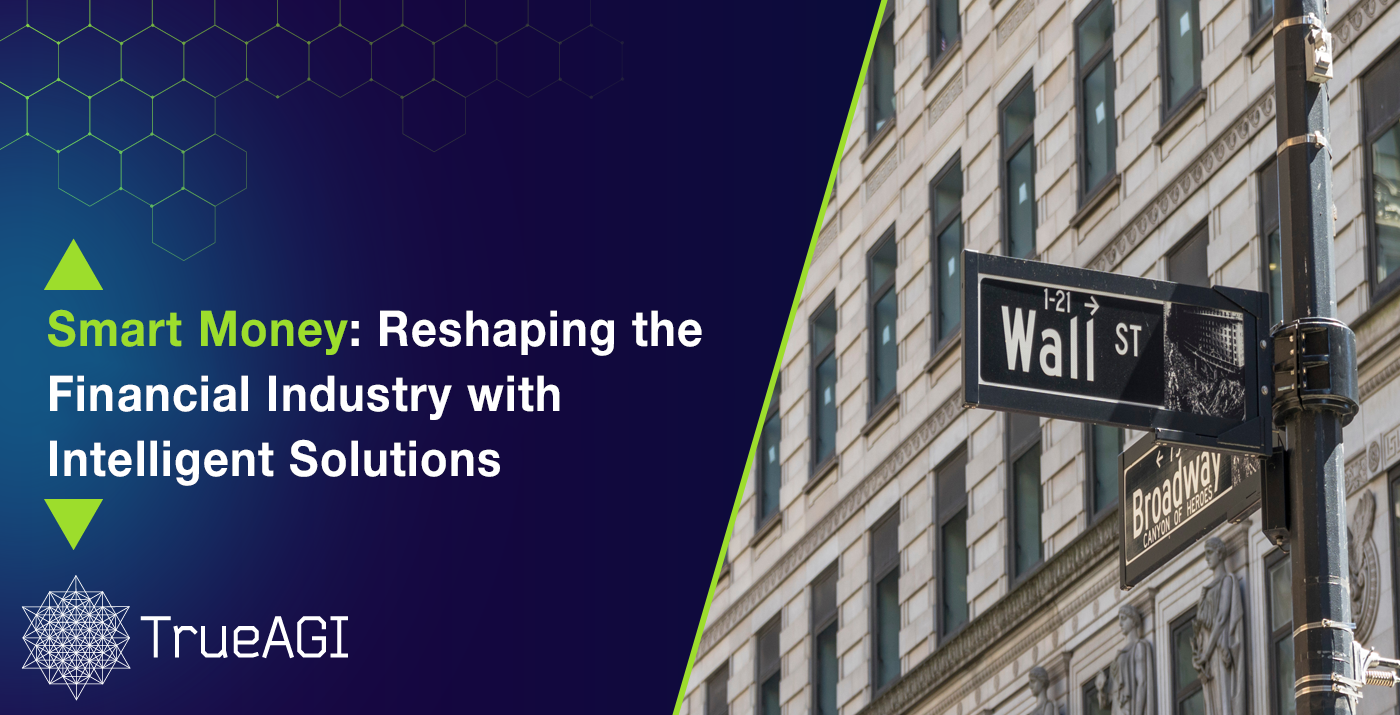Can AGI Help Us Build More Efficient Financial Systems?
The financial industry is one of the pillars of modern society.
The way we interact, represent, and use money has shaped our way of life over the years, from metal coins to digital credit. Technological advances in the field have unlocked many opportunities for both investors and customers.
They have, however, increased the system’s complexity, providing additional problems and risks to the business. These elements have a direct impact on people’s lives, which is why it’s critical to keep improving the global financial systems by lowering risks and inefficiencies.
The Challenges of Modern Finances
The financial system as we know it today has granted billions of people access to important resources and opportunities, but it has also exposed them to significant risks.
Perhaps the most important of these are fraud and security threats. Last year’s data shows that consumers lost more than $8.8 billion to different types of fraud in the United States alone. More importantly, the number has increased by 30% compared to the previous year.
Besides the substantial losses, these episodes also erode trust in the system.
Another critical concern is the presence of prejudice and bias in the system’s leadership. Personal attitudes and impacts on human decision-making in financial institutions can lead to unequal access to financial services and perpetuate socioeconomic inequality.
One statistic that demonstrates the need for inclusion is the amount of people without access to financial services: 1.7 to 2 billion, or roughly 25% of the adult population.
The risk of large-scale disasters, though, remains the most serious issue. The 2008 financial crisis served as a harsh reminder of the financial system’s inherent flaws and dangers.
This unique occurrence demonstrated the serious implications of poor financial practices and tax laws, as well as the enormous impact they may have on people’s lives.
Risks of the Large-Scale Financial Crises
During the crisis, various vulnerabilities that had been building up over time came to light, exposing the negligence and failures of many of the industry’s key players and regulators. Among them, the most significant were:
- Excessive Risk-Taking: Financial institutions engaged in risky practices, such as subprime lending and complex derivatives, without fully understanding or accurately assessing the associated risks. This reckless behavior led to a widespread collapse when the housing market bubble burst.
- Lack of Transparency: Financial instruments, such as mortgage-backed securities, were bundled and sold, obscuring the underlying risks. This lack of transparency hindered investors’ ability to make informed decisions and contributed to the rapid spread of the crisis.
- Inadequate Risk Management: Many financial institutions failed to adequately assess and manage their exposure to risks, relying heavily on flawed models and assumptions. This inability to understand and mitigate risks amplified the overall impact of the crisis, which ended up wiping out $7.4 trillion in wealth.
- Interconnectedness and Contagion: The crisis highlighted the interconnected nature of the global financial system. As events unfolded, the collapse of major financial institutions triggered a domino effect, spreading financial distress and uncertainty worldwide.
- Regulatory Failures: Regulatory oversight and enforcement failed to address the emerging risks and prevent the crisis. The authorities neglected the systemic risks present in the very foundations of the system.
Following the crisis, there were broad calls for financial industry reform and increased responsibility. However, the banking system’s complexity and the authorities’ lack of commitment rendered these demands useless.
These hazards remain throughout the global financial system. Following some fruitless attempts, it has become evident that tackling these difficulties would necessitate the development of new, inventive solutions.
In this regard, artificial general intelligence emerges as a game-changing technology that has the potential to usher in a new era of financial market efficiency and security.
Various artificial intelligence systems can analyze vast amounts of data, detect patterns, and assess risks with greater accuracy and speed. In this regard, AGI holds the potential to take these capabilities to the next level, strengthen risk management practices, enhance transparency, and improve regulatory oversight.
More importantly, these systems can find patterns across all of these data modalities and correct or adjust decisions based on the priorities set by financial professionals in real time. Plus, they can also consider elements beyond its data set into the analysis, such as recent events, politics, trends, or economic regime changes to produce reality-grounded results.
By utilizing AGI, financial organizations could gain deeper insights into complicated financial networks, spot emerging dangers, and make more informed decisions. Furthermore, their ability to generalize knowledge allows these technologies to seamlessly integrate these financial insights into other business processes, making sure the entire organization is aligned with its financial vision, goals, and strategy.
While the 2008 financial crisis revealed major faults in the financial system, it also served as a catalyst for reevaluation and transformation. AGI provides an opportunity to restructure the financial industry, strengthen resilience, and foster a more stable and secure financial system capable of withstanding future difficulties.
Artificial General Intelligence: The Missing Link for a Better Finance
The future of finance is data-driven.
Information has become a precious resource that financial institutions can leverage to assess different situations, enhance their decision-making, and improve overall performance of assets and operations.
However, data is only as valuable as the brain that is able to process, interpret, and draw insights from it. Now, while the human is exceptional at performing creative and cognitive tasks, it lacks the information processing speed and storage capacity that computers possess.
In this regard, artificial intelligence emerges as an excellent companion for the human brain.
Yet, the technology’s capabilities fall short when it comes to addressing the financial industry’s complex challenges.
Typically, these systems are designed for specific tasks and lack the flexibility and adaptability required to solve the problems of a dynamic, unpredictable, and constantly evolving industry.
This is where artificial general intelligence comes in.
AGI has the potential to absorb and learn from a wide range of financial data, adapt to changing market conditions, and make sophisticated choices in the same way that skilled financial analysts do.
This ability to adapt autonomously to new conditions makes these systems a valuable tool to address the financial industry’s numerous difficulties. Not only it can continuously find improvement opportunities and increase efficiency across the sector—it can also leverage its data processing and reasoning capabilities to assist financial professionals in many ways, such as creating detailed, real-time reports, offering unique insights grounded on reality that a human may not have thought about, and analyzing different situations and present potential solutions to facilitate sensitive decision making—among many, many others.
Let’s dive into these with more detail.
AGI Applications in Finance
- Enhanced Efficiency: AGI can automate and streamline manual processes, reducing the time and cost involved in activities such as data entry, document processing, and compliance checks. According to Zapier, 76% of employees spend 1-3 hours a day simply moving data from one place to another, while 83% spend the same amount of time looking for and fixing errors. This efficiency boost frees up human resources to focus on higher-value tasks and accelerates decision-making processes.
- Robust Security and Fraud Detection: AGI can analyze vast amounts of financial data, identifying patterns and anomalies to help detect and prevent security breaches. More importantly, by continuously monitoring transactions, these systems can detect fraudulent activities in real-time, strengthening security measures and safeguarding financial institutions and customers. Finally, through its ability to learn from experience, the system can self-improve, becoming tighter and more efficient as it comes across new and different threats, risks, and fraudulent practices.
- Unbiased, Data-Driven Decision-Making: AGI algorithms can minimize unconscious biases by analyzing objective data and making decisions based on predefined rules and parameters. Furthermore, it can also incorporate external factors to the reasoning process, such as political or environmental issues, current trends and recent news. This allows AGI systems to make reality-grounded choices and maximize results.
- Personalized Financial Services: Each individual’s risk tolerance and financial goals are unique. In this regard, AGI can learn from users’ spending patterns, investment preferences, and personal interests to enable the development of personalized financial services. This tailored approach can help financial service providers deliver enhanced customer experiences, improve financial planning and recommendations, and foster long-term customer relationships.
A New Era of Financial Efficiency
Artificial general intelligence represents a transformative shift in human-computer interaction, data science, and business automation, with enormous potential for the financial industry.
Nonetheless, actively regulating AGI implementation will be critical to realizing that promise. Ethical constraints, privacy concerns, and the necessity for human oversight should all be integrated into the development and implementation of AGI in the financial sector.
TrueAGI is focused on delivering personalized AGI solutions for enterprise organizations and businesses that uphold human values such as benevolence, trust, ethics, safety and security (B-TESS).
Artificial general intelligence can unleash a new era of financial security and efficiency, and TrueAGI is dedicated to making this a reality.


Subscribe to our Newsletter
Email Address